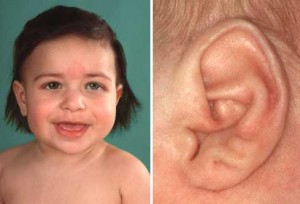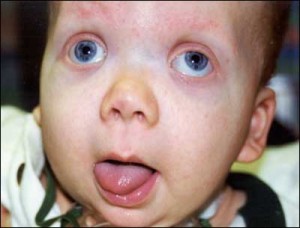Beckwith-Wiedemann Syndrome (BWS) is a rare pediatric overgrowth disorder marked by excessive growth of infants affected by the disorder. Find out everything about this abnormal congenital disease, including its causes, symptoms and treatment.
Beckwith-Wiedemann Syndrome Definition
Page Contents
- 1 Beckwith-Wiedemann Syndrome Definition
- 2 Beckwith-Wiedemann Syndrome Incidence
- 3 Beckwith-Wiedemann Syndrome Synonyms
- 4 Beckwith-Wiedemann Syndrome ICD9 code
- 5 Beckwith-Wiedemann Syndrome Causes
- 6 Beckwith-Wiedemann Syndrome Symptoms
- 7 Beckwith-Wiedemann Syndrome Diagnosis
- 8 Beckwith-Wiedemann Syndrome Treatment
- 9 Beckwith-Wiedemann Syndrome Prognosis
- 10 Beckwith-Wiedemann Syndrome Complications
- 11 Beckwith-Wiedemann Syndrome Prevention
It is an overgrowth ailment which is generally sporadic in nature. The condition mainly affects newborns and has an adverse effect on various parts of their body. Affected newborns are comparatively much bigger than normal infants. They continue to mature and gain weight at an abnormal rate during adolescence. However, this unusual growth slows down as the child turns around 8 years old. In a few cases, children suffering from this disorder suffer from an abnormal enlargement of any specific part of their body, which leads to an uneven appearance. This type of unusual and atypical growth structure is known as Hemihyperplasia.
Beckwith-Wiedemann Syndrome Incidence
The condition is found to arise in 1 out of 15,000 newborns in the U.S and 12,000 newly born infants around the world.
Beckwith-Wiedemann Syndrome Synonyms
The disorder is known by various other names like:
Picture 1 – Beckwith-Wiedemann Syndrome
- Beckwith-Syndrome
- BWS
- EMG Syndrome
- Macroglossia-Omphalocele-Visceromegaly Syndrome
- Omphalocele-Visceromegaly-Macroglossia Syndrome
- Exomphalos-Macroglossia-Gigantism Syndrome
- Visceromegaly-Umbilical Hernia-Macroglossia Syndrome
- Wiedmann-Beckwith Syndrome
- Hypoglycemia with Macroglossia
Beckwith-Wiedemann Syndrome ICD9 code
The ICD9 code for this syndrome is 759.89.
Beckwith-Wiedemann Syndrome Causes
The actual cause of this medical disorder is unknown. In most cases, however, it results due to a random genetic change in the body. According to medical researchers, the disorder arises from various deformities affecting the arrangement of few genes within a particular area of chromosome 11. Patients with this kind of syndrome experience Adrenal carcinoma and Wilm’s tumor.
Beckwith-Wiedemann Syndrome Symptoms
This medical condition is typically characterized by problems like:
Prematurity
Children suffering from this syndrome are born too early and are quite large and heavy, in contrast to normal babies. The gestation period is very less in such cases, as compared to normal pregnancy.
Macroglossia
Children with BWS syndrome have a dilated tongue that can lead to problems in feeding, speaking and breathing along with extreme dribbling. It also increases the possibilities of multiple respiratory problems, such as excessive mucus or Bronchitis. It can also result in overhanging of the lower jaw.
Macrosomia
BWS patients have weight and height above 95% centile.
Ear Lobe Creases
In BWS patients, these types of syndrome are present along with indentation at the back of the top edge of the ear.
Abdominal Wall Deficiencies
This kind of symptom differs, depending on the severity of the disease. Omphalocele is the most severe problem that lets intestines and every other possible organ to bulge out into a membrane casing. Umbilical hernia is considered to be a less significant disorder. Unnecessary weakening and division of the abdominal muscles, which results in a big belly, is the problem that leads to least concern. Lax abdominal musculature can lead to multiple constipation and intestinal problems.
Nevus Flammeus
People suffering from this disorder have red skin on their eyelids and forehead which resolves in the first few years.
Hypoglycaemia
Children with BWS syndrome have low blood sugar level. Unless treated in time, the disease can give rise to severe brain hemorrhage in patients along with other problems.
Wilms Tumors
Presence of tumors in the kidney serves to indicate the mere existence of this disorder. In suffering children up to the age of 7 or 8, MRI or ultrasound scans should be done to determine the condition of the tumor. After the age of 8, the propensity of these tumors reduces. Affected patients, with a one-sided enlargement of the body or bloated kidneys, are more prone to Wilms Tumor.
Hemihypertrophy
In case of an overgrowth in any particular part of the body, the remaining part of the body develops normally and indicates the presence of BWS disease.
Hepatoblastoma
The presence of tumors in the liver confirms the possibility of the existence of this disorder. However, these tumors disappear after 3 years.
Visceromegaly
Abnormal enlargement of liver, spleen, kidney, adrenals and pancreas confirms the existence of this syndrome among infants.
Cardiomegaly or Structural Cardiac Abnormalities
Presence of a bigger heart structure indicates the presence of this syndrome among patients.
Beckwith-Wiedemann Syndrome Diagnosis
A few years ago, this disease was detected only by clinical examination. The diagnosis was done on the basis of any two out of the five major traits found in a patient – such as ear creases or pits, macroglossia, macrosomia at birth, inexplicable hypoglycaemia during the first four months and abdominal wall problems. In recent years, however, various developments have been made in the field of genetics. Due to this reason, genetic diagnosis is performed these days to detect this syndrome among the infants.
Some of the primary tests used to diagnose this syndrome involve:
- MRI of the abdomen
- X-ray of the abdomen
- CT scan of the abdomen
- X-ray of the long bones
- Blood test for various abnormalities and to check the sugar level
- Ultrasound of the abdomen
Beckwith-Wiedemann Syndrome Treatment
Patients suffering from this syndrome require individual treatment for their distinctive problems.
Abdominal Wall Defects
These are frequent among the new born babies, who are affected with BWS. Such patients require surgical treatment to cure their disease. Surgery is required immediately after birth when an omphalocele (It is an inborn deformity found in the body of a new born, affecting the intestine and the abdominal organs which extend out of the abdomen via the umbilicus) is present in the abdomen. Umbilical hernia present in the patient’s body also needs immediate treatment. In normal newborns, this hernia is treated by a surgery, only if it still exists after the age of four. Constipation defects are also one of the common problems faced by such patients, which can be treated by proper medicine.
Wilms Tumour
This requires a proper surgery to eliminate the kidney which is affected by this disorder. In few cases, radiotherapy or chemotherapy is also needed.
Macroglossia
It is a common disease where the size of the tongue increases, indicating the presence of BWS syndrome in the patient’s body. Infants suffering with BWS and this disorder cannot properly close their mouth due to the enlarged size of their tongue. In few cases, Macroglossia can lead to severe feeding, respiratory and speech problems. Surgery is the ideal solution, to minimize the tongue size. Few operations are done before the child is one year old. Surgery includes eliminating a small part of the tongue, so that it fits properly in the mouth. In few selective cases, proper speech therapy is required.
According to few medical professionals and surgeons, surgery should be performed when the child is 3-6 months old.
Hemihypertrophy
This requires an orthopedic surgery.
Hypoglycamia
It can be treated properly via Hydrocortisone and Glucose
Beckwith-Wiedemann Syndrome Prognosis
Patients who survive during their adolescent years grow up well and gain the height of their parent. Infants suffering from this ailment have a risk of suffering from cancer in their childhood. However, children suffering from such cancerous conditions can be cured completely.
A few infants having this particular disorder experience speech problems associated with hearing loss or macroglossia. In such children, mental growth can be slightly retarded. The inflammation of their tongue can result in problems during feeding and sleeping.
Beckwith-Wiedemann Syndrome Complications
Unless cured in time, BWS can lead to various complications such as:
- Hypoglycemia
- Tumor development
- Seizures
- Respiratory problems, due to enlarged tongue
Beckwith-Wiedemann Syndrome Prevention
As of now, there is no preventive measure to avoid the occurrence of this disorder. Parents of BWS sufferers who wish to have more children in the near future can seek help from genetic counseling.
Picture 2 – Beckwith-Wiedemann Syndrome Image
Those having a child in their family with BWS symptoms, such as enlargement of any particular part of the body, should immediately contact a pediatrician. Unless treated in time, the disorder can give rise to serious complications in the future. Hence, proper treatment is mandatory when the symptoms are visible.
References:
http://en.wikipedia.org/wiki/Beckwith%E2%80%93Wiedemann_syndrome
http://ghr.nlm.nih.gov/condition/beckwith-wiedemann-syndrome
http://www.nlm.nih.gov/medlineplus/ency/article/001186.htm
http://www.bws-support.org.uk/what-is-bws


